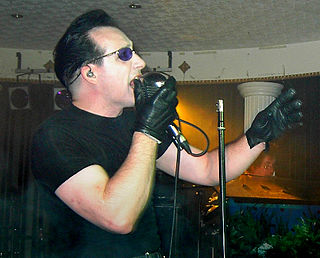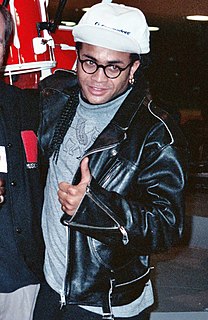A Quote by David Vanian
Unfortunately, you don't get artist development anymore. Record companies have become a huge corporate thing. It used to be you'd meet someone [in the business] and they'd have a little history of music. Some people in the companies now don't even like music. It's just a job. So I miss the days when someone would go out on a limb and pick a band that was different. I just don't see that anymore. It's the same with the film industry.
Quote Topics
Anymore
Artist
Band
Become
Business
Companies
Corporate
Days
Development
Different
Even
Film
Film Industry
Get
Go
History
History Of Music
Huge
Industry
Job
Just
Like
Limb
Little
Meet
Miss
Music
Now
Out
People
Pick
Record
Record Companies
Same
See
Some
Some People
Someone
Thing
Unfortunately
Used
Used To Be
Would
Related Quotes
People don't go to the record store anymore. It's crazy. The culture used to be so much stronger. People would go and support you, and go pick up the album. Not just for the music, but for the liner notes, for the artwork, just for the whole thing and to have it, and be able to say, 'I have this album.'
The business has changed dramatically from what it was even just a few years ago. Music isn't even distributed the same way anymore. Even CDs are becoming a thing of the past. The Internet has made it easier to get my music out to anyone who wants it, but at the same time, I feel like we're losing the mystique.
I'm in the film industry, and I very seldom go to the theater now. It could be work, not being in New York, that sort thing - because in New York, you do go to theaters; you can walk to a theater and then walk to a restaurant. But in places you have to drive out to the cineplex to see a movie, it's starting not to be worth it anymore. It's like the days when you went to get a book at the public library. You don't have to do that anymore. You just go on your iPad and all of a sudden you're reading The Duchess of Malfi.
Record industry's not so much against artists, but certain people are just wicked people that sit up in the industry who go against the artist. The thing is, if you're in the recording business, where's our health benefits? Where's the royalties from when you put stuff on labels in different countries? And now, with all these 500 cable channels, you want your mechanical royalties, your licensing. There's so much technology that you've got to stay on top. They always try to tell you, "Oh, don't worry about the business side, just do the music."
Back in the early days like for the Temptations, Supremes and Four Tops, artist development was alive in record companies. Every artist had a moment to develop the record visually. When the web took over and camera phones, it stripped the artists of the power to figure it out. So there's a need to bridge that gap and that's my job.
I think the music industry, for instance, is such a huge, multibazillion-dollar industry and it's become very, very savvy. There's a very short grace period in which actual human rebellion or resistance can thrive before it's co-opted by these huge companies. And all of youth culture is packaged and sold back to us at this furious rate these days. I think it's part and parcel to this corporate encroachment on our lives in general.
I don't know if there was really ever a golden age of the music business. Most of what was released has always been garbage and some has been able to get through and last. I don't know that it was much better thirty years ago. The music industry just wasn't as efficient. The music industry was more oddball guys who did it for fun and now they are huge corporations that have become more structured.
I think my music being referred to as "cinematic" has a lot to do with people just not being used to listening to instrumental music without watching a film. I'm still pretty convinced of that. You'll play Chopin in place of something average and like, "Wow, that'd be great in a film." People say it every time, swear to God. I don't think people have a good relationship with instruments and music anymore. But it's definitely visual; I started writing with this band because of the pictures. I can't really deny it either, you know?
Unfortunately it's hard for me to be a fanboy for anything these days just because I see so much music. And it's not a namedropping thing, but there's just not that many people in this certain small little genre world we live in that I don't know or am not acquainted with. And I like them all; I get along with pretty much everyone. It wouldn't be unusual to see a thousand collaborations at some point.
Rap music and rap records used to always be like this: we get one or two shots to a piece cause it was a singles marketplace and when the major record companies saw that it could also handle the sales of the albums then they started to force everybody to expand their topics from 1 to about 10 and you gotta deliver 12 songs, so a lot of times if you took a person who wasn't really developed, and the diversity of trying say 12 different things, you know the companies were like "Cool! Say the same thing 12 different ways."
A lot of people are like, "Oh, it's so much easier to be a supermodel now because you have Instagram. You don't even need an agency anymore." But that's just not true. I still had to go to all the castings, I still had to go meet all the photographers, I still had to do all of that to get to where I am now. There wasn't a step taken out just because I had social media. I still have 12-hour days, I still have even 24-hour days sometimes; I still have to do all those things. We don't work any less hard than the '90s models did when they were young.



































